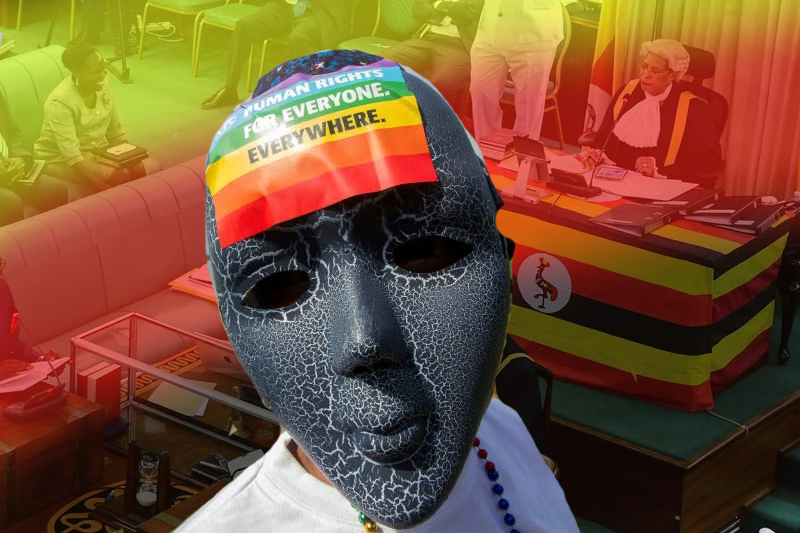

uganda passes anti homosexuality act, slap on human rights
A new law passed in Uganda imposes stringent rules on the LGBT community. One of the strictest laws of its kind in the world, the Anti-Homosexuality Act 2023 was almost unanimously approved.
Among its punishments are the death penalty for “aggravated homosexuality,” a 20-year prison term for “promotion” of homosexuality, and a maximum sentence of seven years in prison for landlords who rent to queer people.
According to Reuters, after the original bill’s passage in March—which has since been amended—queer Ugandans began to be attacked, arrested, and forced to leave their homes out of fear for their safety. According to Reuters, 10 people and a local human rights organization called the Human Rights Awareness and Promotion Forum have already filed complaints against the law.
Adrian Jjuuko, a human rights attorney, claims the new regulations violate the constitutional rights to equality and non-discrimination. Proponents of human rights are concerned that the passage of the law will encourage Tanzania and Kenya, which are neighbors, to enact similar restrictions. President Yoweri Museveni was warned by the U.N. and other Western countries not to sign the legislation, and they have since threatened to withhold aid. American President Joe Biden said the new law “jeopardizes the prospects of critical economic growth for the entire country.” No one “should have to live in constant fear for their life or being subjected to violence and discrimination,” according to Biden, who also called for the law’s repeal.
The new law will not only restrict fundamental human rights but also negatively impact public health. Leaders of the U.N. A.I.D.S. program, the U.S. President’s Emergency Plan for A.I.D.S. Relief, and the Global Fund have stated that “Uganda’s progress on its H.I.V. response is now in grave jeopardy.” These experts caution that the law will “obstruct health education and the outreach that can help end A.I.D.S as a public health threat.”
For his part, Museveni urged his legislators to reject outside pressure, contending that homosexuality is a “deviation from normal” that needs to be criminalized. Some Ugandans, according to the Associated Press, view homosexuality as a behavior that has been “imported from abroad.”
One South American filmmaker said, “We can compare [the life proposed by the new law] to apartheid, if not worse.” Ugandans’ right to equality is flagrantly violated by the Anti-Homosexuality Act 2023, but President Museveni “has never respected human rights,” according to Steven Kabuye, co-founder of Truth L.G.B.T.Q.
Kabuye appealed for assistance from other nations and urged them to welcome Ugandans who identify as queer. “Let us at least have temporary help, as we fight this draconian law,” he begged.
Strict anti-LGBTQ laws have long been a problem in Uganda and throughout Africa. Legislators in Uganda introduced a bill in 2009 that called for the execution of homosexuals. Another anti-LGBTQ law was being considered in 2014 when Western governments cut off foreign aid and tightened visa requirements. The Associated Press reports that 30 of Africa’s 54 nations also have anti-L.G.B.T.Q. legislation.
European values brought to Africa during the colonial era are to blame for anti-LGBTQ attitudes, but many former colonies did not follow the U.K.’s lead when it relaxed its laws.
The L.G.B.T.Q. Ugandans, human rights activists, and their allies will face serious threats to their health, well-being, and fundamental rights due to the Anti-Homosexuality Act 2023. These Ugandans are already in danger, not only from the law but also from those who use it as a justification for prejudice against the L.G.B.T.Q. community. Reaching out for assistance may become dangerous if it threatens life, and those who have already been diagnosed may not receive the care they need. The law is hurting international relations in addition to its apparent internal effects. Western countries have already threatened to cut off aid and ties with Uganda, making it potentially vulnerable in several ways.
Criminalizing a character trait is unjustified and cruel. To persuade Uganda’s legislature to reevaluate and withdraw the proposal, pressure from international governments and human rights organizations is crucial.
Judge William Alsup finds federal government should restore positions to all probationary workers whose employment ended unlawfully. On Thursday a…
The UK government has brought in new regulations for employing staff within the care industry. From April 9, 2025 care…
Afghan migrants deported from the United States to Panama now face an uncertain future. Many of these deportees feel stranded…
A major strike that would have practically paralyzed Argentine soybean processing, a world leader in the supply of soybean oil…
Korea is developing a unique training program to train Uzbek workers for shipbuilding jobs in its country. Before they arrive…
In January, when Trump became president, the U.S. Education Department workforce reached half its size due to laying off 1,300…
This website uses cookies.
Read More